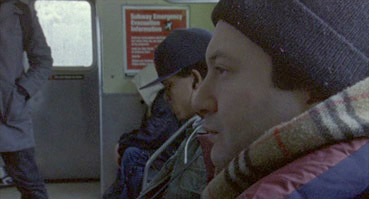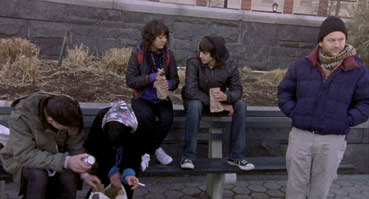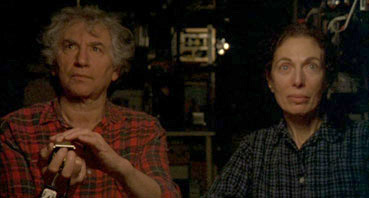|
Mikey is in his mid-30s, recently married and father to a baby girl. At the opening of Momma's Man he bids goodbye to his parents and leaves their flat in New York, intending to return home to California after a business trip. After a train ride through a grime-bright wintry city seen through graffiti-sprayed subway windows, the carriage doors open at JFK airport. Mikey doesn't move. Next thing he's back at his parents, claiming that his flight has been cancelled and that he'll be staying for another night. One night turns into two, booking a return ticket becomes more and more unlikely, and Mikey stops answering calls from his increasingly irate wife. Pretty soon, Mikey has all but moved back in and shows no sign of making any effort to return to his adult life.

Mikey is suffering from malaises that affect a lot of the poker-faced Generation X/Yers who star in American indie cinema: crippling fear of responsibility, emotional retardation, refusal to grow up, discontentment with relationships (for relationships read women in general, as these characters are almost always male). His solution, if it is a conscious decision, is to retreat into the cosy nostalgia afforded by an extended stay with his parents. Director Azazel Jacobs has made an interesting decision in casting his own parents (Ken and Flo) as Mikey's, and they play their roles with endearing honesty: Ken as Mikey's Dad can cut through his son's self-delusions with a single stare over the top of his glasses, and Flo is thoroughly convincing as the quietly nagging mother who Mikey both resents yet comes to depend on. The other star of the show is the cluttered, almost overgrown Tribeca studio flat owned by Mr and Mrs Jacobs, and where Azazel sets much of the action. It is simultaneously lived-in and unfurnished: a mass of books, sculptures, portraits and old toys; but set in a space that has stripped floorboards, bare brick walls, and makeshift plastic sheets as curtains. Its a place that is imbued with character not by the decoration but by its inhabitants. As Mikey starts to make himself comfortable, and reacclimatize to his old home, he unpacks his old childhood possessions: he starts to decorate the house with himself again. He even pins up an old teenage love letter as a kind of wallpaper. The set is so malleable in this respect, Mikey's Dad even manages to pluck an object at random from the room to give to Mikey as a present for his daughter. Its a fascinating place, and makes for a consistently curious location in which the camera can spend its time. Compare this to the house he has left behind in California: occasionally the action re-centres itself by visiting Mikey's wife Laura in their marital home, and its here the contrast between the two lifestyles that Mikey finds himself caught between is brilliantly articulated. Laura, on the phone to Mikey trying to convince him to come home, walks into her living room. The camera drifts through the room and passes a mirror on the wall – inconspicuous enough, but leaning on the wall next to the it are several other mirrors, all in boringly similar styles and colours, evidently other options that were considered for the spot on the wall but rejected. That little moment says everything about the crushing domesticity from which Mikey is relieving himself.
All of this is shot with a digital-style lo-fi aesthetic (possibly Super-16), which is perfectly suited to images of urban winter. The whites and greys of the city, the snow and the bright white skies, lend themselves well to the granular frame surface, really augmenting the downbeat atmosphere. This is also helped by the sound design, which is produced in such a way that even the smallest rustles sound like they're being whispered in your ear: whereas this can often feel comforting in a film, here its used to great effect as a device for highlighting the oppressive, tightly packed atmosphere of the Tribeca apartment.

As Mikey spends more of his time away from his wife and child however, he degenerates rapidly thanks to the nostalgia drug he's dosed himself up with. The slow descent into adolescence is not represented as a freedom but as an emotional backtrack. The interesting thing about his regression – and its a testament to how thoroughly well the character is written that this is believable - is that Mikey becomes how he actually was as a teenager. He becomes socially awkward and agoraphobic, staying in the flat while is parents go out, reading comic books and wasting time: at one point we see him shaving, but he coats his entire face in shaving foam just to prolong the process. He lies in bed all day, stops dressing, argues with his mother and pines over his ex-girlfriend. He even stops dressing himself as his life completely grinds to a halt. This is far from the celebratory manboys that big budget comedies like The Hangover and Forgetting Sarah Marshall give us; instead Mikey is completely authentic. The only time we see him try and engage with real teenagers, or a more extrovert experience of youth, is when he obliges a group of underage drinkers in their requests that he buy them some beer. He delivers the goods and then stands to one side of the group as they divvy up the cans, completely ignoring him until he casually shuffles off after an excruciatingly long wait for some kind of engagement from them. He was an awkward, lonely adolescent the first time round, and he's not any different the second time.
By the time Mikey attempts to throw himself down the stairs in a bid to kill himself (or I suspect hurt himself enough to remove his responsibility to his wife and daughter), you do start to lose patience with him, which is really the only flaw that Momma's Man has. Mikey's path to redemption is so clear – grow up, take care of those who need you – that its hard to suffer him for very long. This despite a dazzling performance from Matt Boren, who shoulders the burden of engagement for most of the action. Boren withstands the scrutiny of the many close-ups that are used in the film and does the impossible in making Mikey slightly sympathetic – a victim of his own insecurity and a little web of white lies more than intended maliciousness.
On balance, Momma's Man is a film with a curious premise that turns out to be entirely plausible, played as it is with such conviction by all involved. Although Mikey is not the most likeable character ever to grace the screen his story is an interesting one, and its told with authenticity and empathy. Well worth seeing.
As discussed above, Momma's Man has a digital aesthetic, in spite of (apparently) being shot on film, and like its digital brethren is displays an increase in grain when the picture gets dark and is not so good on detail in shadow areas. It's a dark looking film overall, though, the low key lighting achieved largely through what looks like practicals and available light, though even daytime exteriors feel a little toned down. The contrast is good within these restrictions and it's reasonably sharp, though fine detail can be a little soft on wider shots. The framing is 1.85:1 and the picture is anamorphically enhanced.

The Dolby stereo 2.0 soundtrack is clear but has little pronounced frontal separation, but subtlety is the watchword here, with even the score effectively low key.
The interview with director Azazel Jacobs (08:35) is interesting, and Jacobs himself is a thoughtful bloke who's willing to talk fairly directly about some pretty personal topics: his apprehensions around casting his own parents in the film, using their apartment as a set, his father's art work and using old home movie footage of the director as a little boy in the film itself.
The trailer (02:07) hits all the right notes and ramps up the film's awards/festival pedigree
This is a film that was widely acclaimed on the indie circuit and was well-received critically upon its first release. It would be a shame to miss out on something that is this striking. Made with heart and a great deal of personal investment from the director, its been given a solid DVD release here. Great disc menus too.
|